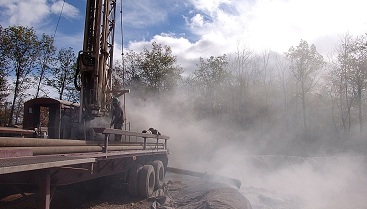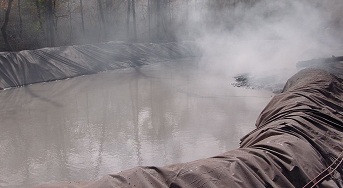Hazardous Hydrofracking in America
Today's nightmare may be expanded beyond remediation, at least in our lifetimes unless public rage stops it. Corrupt politicians won't do it.
Hydraulic fracking involves using pressurized fluids to fracture rock layers to release oil, gas, coal seam gas, or other substances.
Earthworks says the process provides easier access to deposits and lets oil or gas "travel more easily from the rock pores," where it's trapped, "to the production well." Fractures are created by pumping mixtures of water, proppants (sand or ceramic beads) and chemicals into rock or coal formations. Acidizing involves pumping acid (usually hydrochloric acid) into the formation. It dissolves rock so pores open for easier flows. Fracking and acidizing are often done together.
Studies show from 20 - 40% of fracking fluids remain underground. Fracking fluids contain hazardous toxic chemicals, known to cause cancer and other diseases. They include diesel fuel, containing benzene, ethylbenzene, toluene, xylene, naphthalene and other chemicals. They also include polycyclic aromatic hydrocarbons, methanol, formaldehyde, ethylene glycol, glycol ethers, hydrochloric acid, and sodium hydroxide.
Small amounts of benzene alone can contaminate millions of gallons of groundwater used for human consumption. According to the EPA, 10 of 11 US coalbed methane (CBM) basins are located at least partially in areas of underground sources of drinking water (USDW).
EPA also determined that nine or more harmful to human health fracking chemicals are used in normal operations. "These chemicals may be injected (in) concentrations anywhere from 4 to almost 13,000 times" above acceptable amounts. According to hydrodynamics expert John Bredehoeft:
"At greatest risk of contamination are the coalbed aquifers currently used as sources of drinking water." "(C)ontamination associated with hydrofracturing (can) threaten the usefulness of aquifers for future use."
At issue also is obtaining information on specific fracking chemicals used. According to the Natural Resources Defense Council (NRDC), oil and gas companies won't release what they call "proprietary information."
Current regulations exempt oil and gas drilling from major environmental laws, including the Safe Drinking Water Act, Clean Air Act, and Clean Water Act.
On March 3, 2011, New York Times writer Ian Urbina headlined, "Pressure Limits Effort to Police Drilling for Gas," saying:
In 1987, congressional lawmakers weren't told about hazardous wastes from oil and gas drilling in an EPA report. Author Carla Greathouse discussed them, but they were excluded.
like science didn't matter," she said. "The industry was going to get what it wanted, and we were not supposed to stand in the way."
Her experience wasn't isolated.
"More than a quarter-century of efforts by some lawmakers and regulators to force the federal government to police the industry better have been thwarted, as EPA studies have been repeatedly narrowed in scope and important findings have been removed."
Pressure is applied to cut red tape to help energy companies reduce dependency on foreign imports. Natural gas drilling companies are exempted from at least parts of seven sweeping environmental laws, regulating clean air and water.
In 2004, EPA studied hydrofracking, discovering hazardous contamination of one or more aquifers. However, a sanitized report said
the process "poses little or not threat to drinking water." [Afterwards,] "EPA whisleblower (Weston Wilson) said the agency had been strongly influenced by industry and political pressure." "It was shameful," he said, explaining that "five of the seven members of the study's peer review panel were current or former employees of the oil and gas industry." [Yet the study became] "the basis for this industry getting yet another exemption from federal law when it should have resulted in greater regulation...."
In 2010, the EPA began studying hydrofracking's environmental impact. However, responding to industry pressure, its scope is limited and final results won't be published until 2014.
Initial plans called for considering toxic fume dangers released during drilling, the impact of drilling waste on food and water, and risks of radioactive waste.
Yet final study plans removed them. Earlier ones also called for studying landfill runoff contamination risks where drilling waste is dumped. This was also excluded despite EPA officials acknowledging that sewage treatment plants can't properly treat drilling waste before it's discharged in waterways near or supplying drinking water.
Moreover, regional studies underway or planned will be cancelled, further narrowing the possibility of full and accurate reports of hydrofracking's harm to human health.
EPA scientists said high-level administration pressure thwarted efforts to institute more rigorous enforcement even though some in Congress want it. Recipients of industry campaign contributions (bribes), of course, strongly oppose any regulations.
The Times quoted White House energy and climate director Carol Browner as 1997 Clinton administration EPA head telling 60 Minutes:
"Whatever comes out of the ground, you don't have to test it. You don't have to understand what's in it. You can dump it anywhere."
Discussing oil and gas industry toxic waste exemptions, she added that "Congress should revisit this loophole." At the same time, her history shows strong industry support. For example, in 1995, she helped ensure hydrofracking was excluded from parts of the Safe Drinking Water Act.
Today, widespread natural gas drilling "is forcing the EPA to wrestle with questions of jurisdiction over individual states and how to police the industry despite extensive exemptions from federal law."
Contamination is a serious problem. "The stakes are particularly high in Pennsylvania, where gas drilling is expanding quickly, and where EPA officials say drilling waste is being discharged with inadequate treatment into rivers" providing drinking water for 16 million people.
At issue, of course, is why is this allowed to go on when human health risks are so high. Moreover, federal laws are ignored. For example, ones affecting sewage treatment plants say operators have to know what's in waste they're receiving and must assure it's safe before discharging it in waterways.
However, in Pennsylvania and elsewhere, EPA lawyers say rules are broken. One unnamed official said:
"Treatment plants are not allowed under federal law to process mystery liquids, regardless of what the state tells them. Mystery liquids are exactly what this drilling waste is, since their ingredient toxins aren't known." "The bottom line is that under the Clean Water Act, dilution is not the solution to pollution. Sewage treatment plants are legally obligated to treat, not dilute, the waste."
Yet plants "are breaking the law. Everyone is looking the other way," so people in Pennsylvania and elsewhere are ingesting hazardous toxins authorities aren't preventing from ending up in drinking water.
Moreover, when federal regulations are lax, enforcement is left up to states that fall short by bowing to industry pressure.
According to Earthworks, it's "unconscionable that EPA is allowing (hazardous) substances" to contaminate drinking water across America. It's as bad that too few people understand the risk and aren't raising hell to stop it.
Against them are powerful industry giants muscling through Congress and regulatory agencies like EPA whatever they wish. They're doing it for planned Marcellus Shale development. It extends over eastern US states, including New York, Pennsylvania, Ohio, Maryland, West Virginia and others.
They want no hydrofracking restrictions impeding gas drilling, no matter the cost to human health. Extracting it from shale deposits holds potential to give America the world's largest supply. It's believed Marcellus Shale alone has enough gas to sustain US needs for 14 or more years, maybe longer depending on how much is found.
Moreover, Utica Shale Appalachian Basin deposits are believed to be larger. Obama's "energy independence" goal and subservience to industry wishes drive Washington's cooperation. With significant revenue potential, local officials do the same.
As a result, regulatory restraints are abandoned despite known fracking hazards, including reckless use of toxic chemicals and their disposal.
In a race to capitalize on industry potential, states are brazenly supporting energy company interests at the expense of their residents. Pennsylvania, in fact, became hydrofracking's wild west. New wells under development doubled from 2009 to 2010 at the cost of contaminated drinking water increasing at an alarming rate.
Hundreds of millions of gallons of toxic waste fluids are dumped into rivers and streams annually. No regulations prohibit it. Wastewater treatment plants can't flush out toxins let alone dangerous radioactive materials contaminating areas forever.
In addition, recycling methods don't work because with each use, waste fluids become more contaminated, compounding the problem of ultimate disposal.
Moreover, the longer unsustainable practices continue, the harder it will be to find workable solutions. Planned Marcellus Shale development alone calls for at least 50,000 new wells in the next two decades, up from 6,400 permitted now.
At this pace, contaminated drinking water will cause epidemic illness levels affecting tens of millions of people across vast areas where hydrofracking occurs. Corrupted politicians in bed with oil and gas interests allow it, abandoning public safety.
For example, C. Alan Walker heads Pennsylvania's Department of Community and Economic Development (DCED), given regulatory-free authority to expedite job creation. His mandate says by any means, including by hazardous hydrofracking drilling.
Similar measures are freeing gas drillers throughout the region and elsewhere. Nationwide, business, not public needs, are served. In potentially rich energy areas, caution and environmental laws are trashed to give drillers free reign.
Energy giants only want profits. Bought off politicians cooperate. Public health and environmental concerns are abandoned. Vast parts of America now are contaminated.
Imagine how much worse they'll be as hydrofracking drills thousands more wells.
Today's nightmare may be expanded beyond remediation, at least in our lifetimes unless public rage stops it. Corrupt politicians won't do it.
___________________________________________________________________________________

Stephen Lendman: I was born in 1934 in Boston, MA. Raised in a modest middle class family, attended public schools, received a BA from Harvard University in 1956 and an MBA from the Wharton School at the University of PA in 1960 following 2 years of obligatory military service in the US Army. Spent the next 6 years as a marketing research analyst for several large US corporations before becoming part of a new small family business in 1967, remaining there until retiring at the end of 1999. Have since devoted my time and efforts to the progressive causes and organizations I support, all involved in working for a more humane and just world for all people everywhere, but especially for the most needy, disadvantaged and oppressed. My efforts since summer 2005 have included writing on a broad range of vital topics ranging from war and peace; social, economic and political equity for all; and justice for all the oppressed peoples of the world like the long-suffering people of Haiti and the Palestinians. Also co-hosting The Global Research News Hour, occasional public talks, and frequent appearances on radio and at times television. I also am a Research Associate of the Centre for Research on Globalization. I live in Chicago and can be reached at lendmanstephen@sbcglobal.net. Also visit my blog site sjlendman.blogspot.com and listen to The Lendman News Hour on RepublicBroadcasting.org Monday - Friday at 10AM US Central time for cutting-edge discussions with distinguished guests on world and national issues. All programs are archived for easy listening. My new book "How Wall Street Fleeces America: Privatized Banking, Government Collusion and Class War" can be ordered HERE.
___________________________________________________________________________________
Photos: The Hemlock [Volume 2, Issue 6 (March 2009)]
URL: http://www.a-w-i-p.com/index.php/2011/10/27/hazardous-hydrofracking-in-america


























